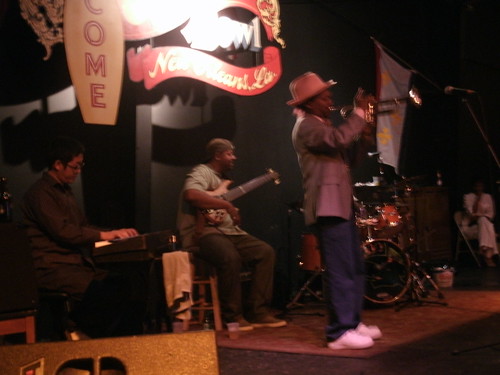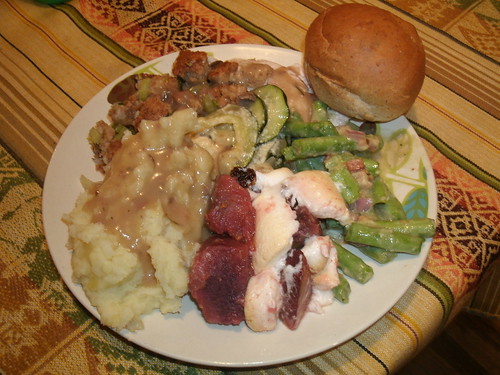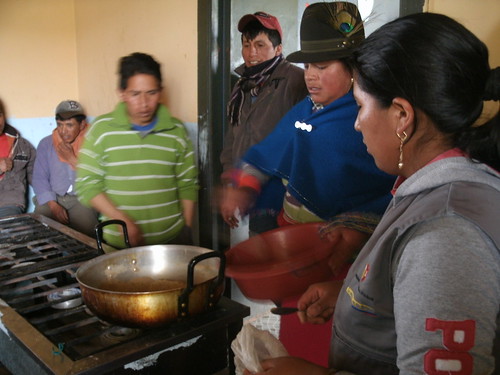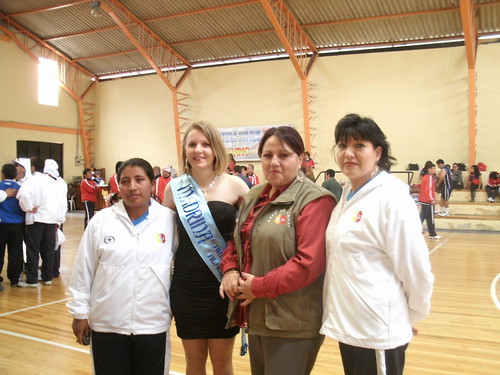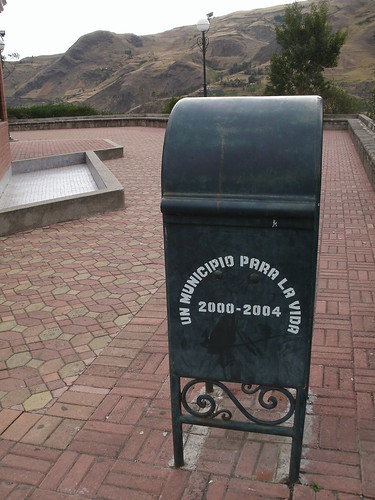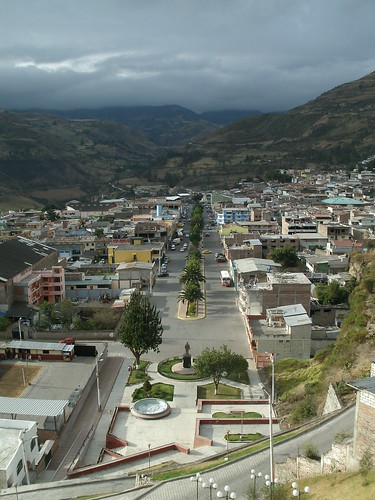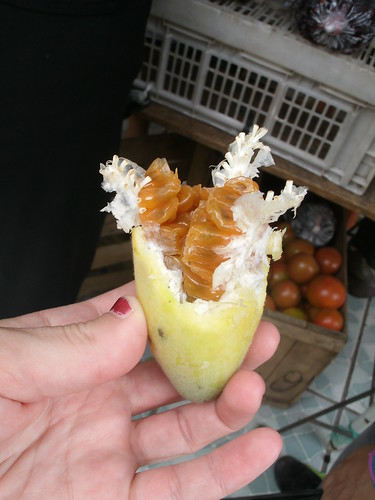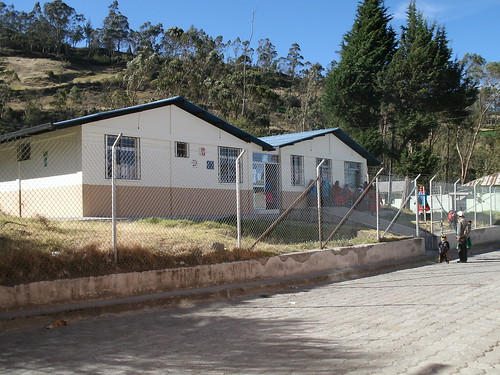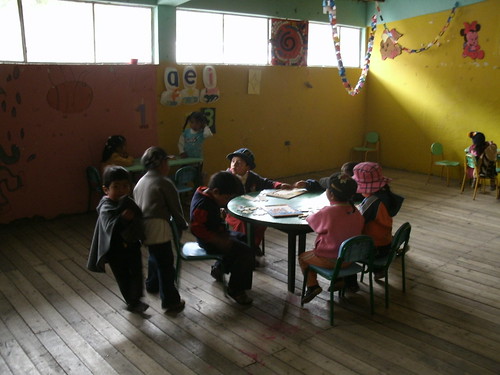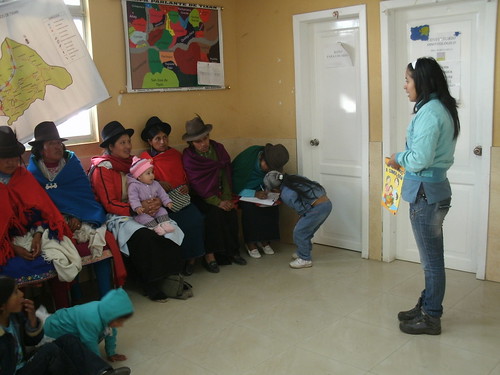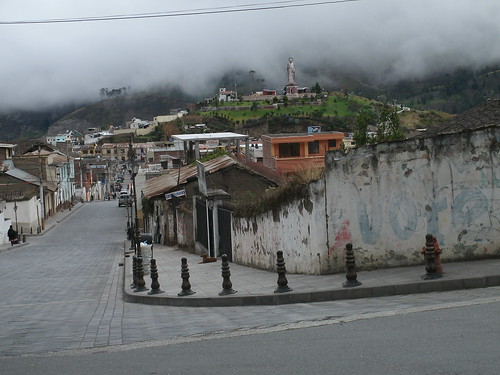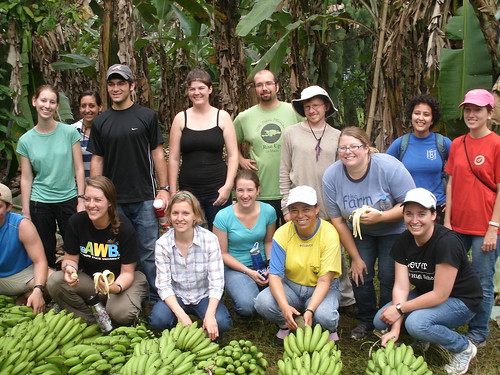Well hello there! I guess it's about time for another update from the field.
It's been an interesting month and a half so far. I feel like I'm starting to get things figured out, and the more I do, the more excited and overwhelmed I get. There are so many people to meet and things to do and problems to solve and a thousand potential projects that should have been started 5 years ago.
To start, work is good, or at least it's getting good. I've been giving lots of nutrition advice to moms and pregnant ladies at the health clinic in Tixan, which has been going pretty well since my Spanish is getting a lot better. My little spiel about malnutrition is pretty solid and I just tweak it depending on who I'm talking to and how the conversation is going. The clinic has been overwhelmed by patients the last few weeks because the fiscal year (or whatever) for one of the welfare-type programs in Ecuador ended in September, or rather, it was supposed to end in September. The way the program works is that parents with kids under 5 can get $35 a month for an entire year, but they have to document that they're keeping up with vaccines and checkups. Unfortunately, a lot of people haven't kept up with either of those things over the last 12 months and now they're scrambling to get an appointment and get their paperwork signed so they can get the money. The program extended it's fiscal year for an additional week in a lot of rural areas (including Tixan), and I wouldn't be surprised if a second extra week is added. Last Monday morning, there were probably close to 300 people trying to get an appointment at my little clinic! That is a lot.
When I got here, my counterpart told me that malnutrition was a big issue, but never having witnessed this kind of poverty before, it was pretty shocking just how big of an issue it is. I don't know statistics, but just based on the number of kids under 5 that I see every day who are very short and/or underweight (based on national growth charts), I can tell you that malnutrition is rampant. The type of malnutrition we're talking about is protein-calorie deficiency which basically means they don't get enough food overall, but particularly protein-rich foods.
I mentioned in my last post that during my interviews a high percentage of people reported eating meat two times a week or less, and thats pretty typical. Also, when they do eat meat, its not like every person in the family gets a boneless, skinless chicken breast. Most often it'll be a chicken neck or foot or other random animal part that has more fat, skin and gristle than meat (I know this from experience... I'm convinced all chicken breasts are sent to the United States). Lots of people (but not an overwhelming majority) have a milk cow so they have access to milk several times a week if not every day, but not everyone boils the milk and they often let it sit out for long periods of time because they don't have refrigerators. About a third of families own chickens, so they probably eat eggs several days a week, but those that don't have chickens at their disposal eat eggs a couple times a week. Most people eat vegetables almost every day and many have a family garden. Fruits (besides blackberries) don't grow here, so everyone has to buy them if they want them. The things that do grow here are grains and beans: barley, corn, quinoa, wheat, peas and quite a few other types of beans that I had never heard of before I got here.
So what do I say to the moms with malnourished kids? First, I explain what malnutrition is and why its bad, namely kids don't develop properly and they are sick more often. I once read that the brains of malnourished kids develop 30% less. I tell the moms that if they want to have strong, tall, smart kids, they have to feed them properly.
Second, we chat for a bit about how often they eat meat, eggs, milk products, whole grains and beans so I can get an idea of how to advise them. Then we talk about how they can add more of these things to their kids' diets. Sometimes this is the hardest part. People can't buy more meat. Sometimes they can buy an extra egg or two at 10 cents a pop, but most people are pretty strapped for cash and live way in the hell up in the mountains and only come down to the market once or twice a week. (And everything they buy they have to carry back up the mountainside, so it can't be an outrageous amount.) I usually encourage them to eat more "menestra", a traditional dish that basically consists of lentils or beans in sauce with rice. And quinoa, the miracle grain! And also milk and eggs if they can manage it. The important thing is that they demonstrate the intention to increase the protein in their kid's diet, and don't just nod and say "Si, doctorita" after everything I say.
Lastly, if I've still got their attention, I explain that there are actually 3 things that factor in to malnutrition and nutrition is just one. The other two are hygiene and water. Both are possible sources of parasites, amoebas and other bad things that want to live in the guts of children and make them very sick. We talk about the importance of handwashing and drinking boiled water, which are two things that don't seem to happen much. I had a few interview questions about handwashing and drinking water, but it seemed like those were more sensitive questions than the others and I'm not sure how honestly people answered.
Obviously, I'm not a professional dietician and I'm sure some people reading this are cringing. But to do this job, you don't have to be a professional. About half of the people I talk to say they weren't aware that their kids needed to eat things other than rice and coladas (drinks mixing water and various grains in flour form). The information just isn't well known. Plus, if you think about it, how many of these parents were malnourished children themselves? If thats the case, did they make it through school? Is there even a nutrition class in school if they happened to make it that far? Probably not. In the US, we're obsessed with talking about food and what the latest scientific studies say about it. People here talk about food as well (where in the world do people not talk about food?) but there is no science. There is only tradition and myth. And lots of poverty.
Anyway, there is obviously a lot of work to do. This is just the tip of the ice berg. The interviews illuminated a few other things in the realm of water safety and hygiene, but I'm not exactly sure how to tackle that just yet. Right now, I'd love to do some health classes at the local schools and work with the day care centers on hygiene as well. Get 'em while they're young! A new nutrition intern just started her six months working with me in the communities so we're in the process of making an action plan. She is super excited to go out and start mom's clubs, which sounds great to me.
We also have a radio show! It's sort of bizarre how easy it was to get on the radio and how little oversight there is. But it seems to be going alright. I'm pretty sure I'm terrible to listen to, but I'm hoping that the information is interesting enough that people can listen beyond my stumbling in Spanish. I stutter enough as it is without being broadcast to potentially thousands of people. We get 30 minutes Wednesday mornings from 7:30-8am and we are assisted by the lovely Esther, who translates the information into Kichwa. Its a pretty awesome gig!
Socially, I'm doing alright. I don't have any friends in town yet, besides the other volunteer that lives just up the road from me. I'm starting to think about looking for a place of my own because family living is just a bit too difficult for me. I like the family quite a bit and I'd be happy to hang out with them, but I want my own space, and specifically my own kitchen to eat things other than rice and fried meat. Did I mentioned my pants are on the verge of not fitting anymore? Yeah, I'm pretty sure thats rice weight. Sometimes they put lard in the rice. I wish I were kidding.
Oh, but you know, things are pretty good. I feel lucky to be where I am because it's gorgeous. The dramatic valley and mountain thing going on here is just unbelievable. Jugo de mora (blackberry juice) is delicious and yesterday I discovered that the bakery in town that I frequent for my whole wheat rolls also makes these popover things on Sunday afternoons that are filled with blackberry jam. YUM. People are pretty friendly, I just continue to be as awkward about small talk in Spanish as I am in English. I am really praying that I get better at it.
As always, I'd love to hear from you and I promise to send a personalized email response! Or if you feel so bold as to send me a letter or package by post, I will do my best to respond in the next few months. Hope all is well in the Great U. S. of A!



